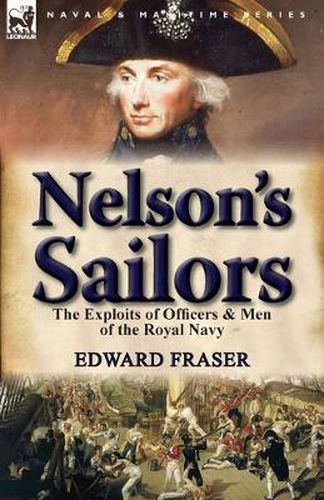Readings Newsletter
Become a Readings Member to make your shopping experience even easier.
Sign in or sign up for free!
You’re not far away from qualifying for FREE standard shipping within Australia
You’ve qualified for FREE standard shipping within Australia
The cart is loading…






This title is printed to order. This book may have been self-published. If so, we cannot guarantee the quality of the content. In the main most books will have gone through the editing process however some may not. We therefore suggest that you be aware of this before ordering this book. If in doubt check either the author or publisher’s details as we are unable to accept any returns unless they are faulty. Please contact us if you have any questions.
Accounts of the ‘Hearts of Oak’ As the European age of empires developed it was inevitable that, as an island state, Britain would develop as a nation of sailors and that in consequence its need for a powerful navy would exceed that of its European neighbours who could potentially expand by land and therefore have a need to defend long land borders. So the ‘great age of sail’ was epitomised by the Royal Navy. From the time of Drake and the defeat of the Spanish Armada the British navy grew in in both its renown and its efficiency. In the eighteenth century, as the wars with France raged, the Royal Navy’s finest commanders became national heroes and gained everlasting fame. By the turn of the nineteenth century the greatest threat to European stability was the rise of Revolutionary, Consulate and Imperial France under Napoleon Bonaparte. This brought about momentous conflicts on both land and sea. It was a period defined by Britain’s greatest sailor, Nelson-a commander so revered and capable that no Frenchman was his equal. However, Nelson was no anomaly, the British navy produced a succession of great commanders who were almost his equal. This was a time when British sea power was at its zenith; after the Napoleonic Wars the Royal Navy would not fight another major action until Jutland in the First World War. The author of this book-originally titled The Sailors Who Nelson Led-specialised in Napoleonic history and presented it as a series of interesting vignettes. This book’s companion title, Wellington’s Soldiers, is also published by Leonaur.
Leonaur editions are newly typeset and are not facsimiles; each title is available in softcover and hardback with dustjacket.
$9.00 standard shipping within Australia
FREE standard shipping within Australia for orders over $100.00
Express & International shipping calculated at checkout
This title is printed to order. This book may have been self-published. If so, we cannot guarantee the quality of the content. In the main most books will have gone through the editing process however some may not. We therefore suggest that you be aware of this before ordering this book. If in doubt check either the author or publisher’s details as we are unable to accept any returns unless they are faulty. Please contact us if you have any questions.
Accounts of the ‘Hearts of Oak’ As the European age of empires developed it was inevitable that, as an island state, Britain would develop as a nation of sailors and that in consequence its need for a powerful navy would exceed that of its European neighbours who could potentially expand by land and therefore have a need to defend long land borders. So the ‘great age of sail’ was epitomised by the Royal Navy. From the time of Drake and the defeat of the Spanish Armada the British navy grew in in both its renown and its efficiency. In the eighteenth century, as the wars with France raged, the Royal Navy’s finest commanders became national heroes and gained everlasting fame. By the turn of the nineteenth century the greatest threat to European stability was the rise of Revolutionary, Consulate and Imperial France under Napoleon Bonaparte. This brought about momentous conflicts on both land and sea. It was a period defined by Britain’s greatest sailor, Nelson-a commander so revered and capable that no Frenchman was his equal. However, Nelson was no anomaly, the British navy produced a succession of great commanders who were almost his equal. This was a time when British sea power was at its zenith; after the Napoleonic Wars the Royal Navy would not fight another major action until Jutland in the First World War. The author of this book-originally titled The Sailors Who Nelson Led-specialised in Napoleonic history and presented it as a series of interesting vignettes. This book’s companion title, Wellington’s Soldiers, is also published by Leonaur.
Leonaur editions are newly typeset and are not facsimiles; each title is available in softcover and hardback with dustjacket.